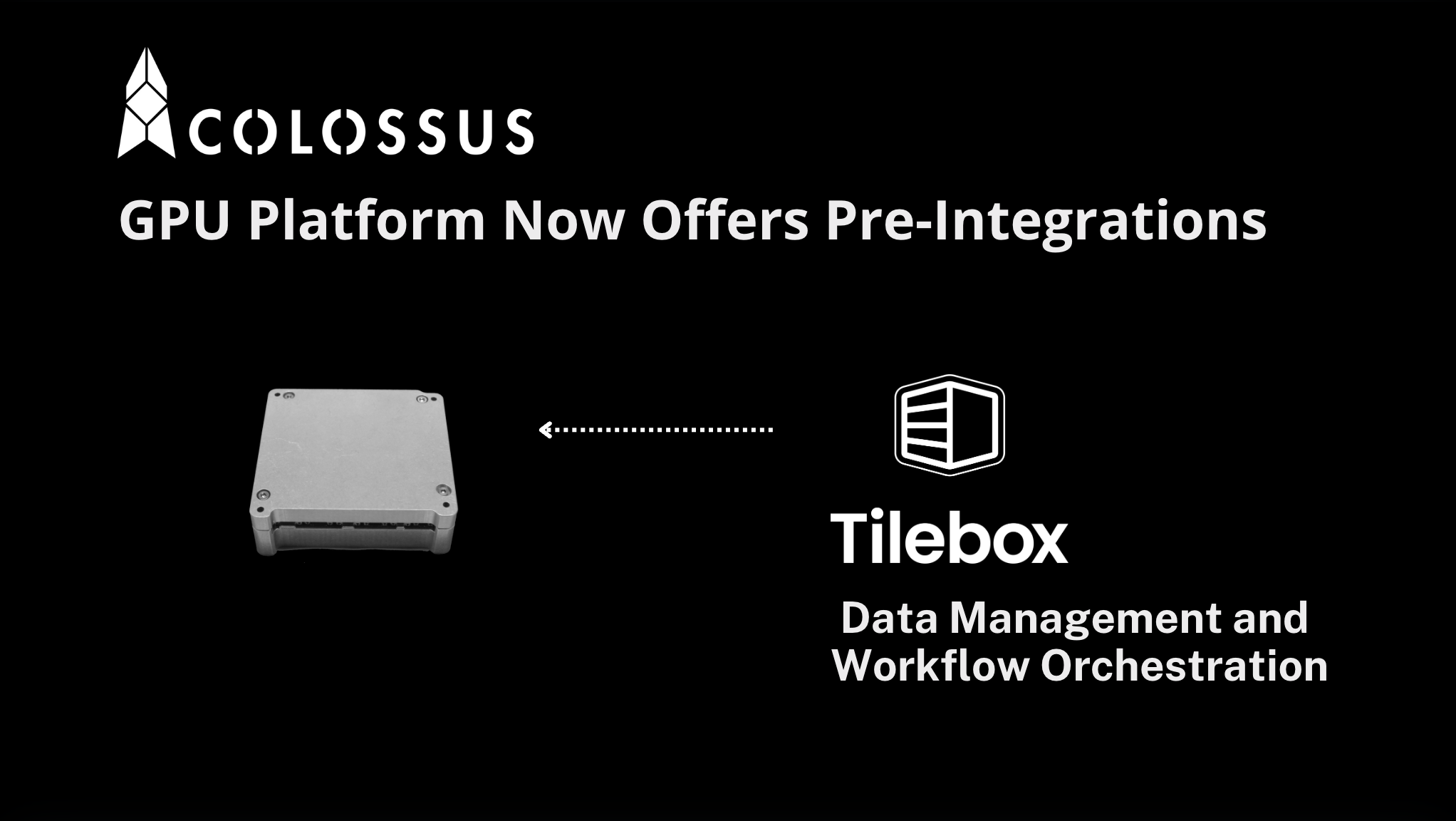Nov 13, 2024
Deploy Your Edge-Compute Mission Faster: Introducing a Colossus and Tilebox Pre-Integration
Jason Cerundolo, CEO of Colossus, and Stefan Amberger, Co-Founder of Tilebox
On-orbit data processing, or (OBDP) is unlocking the next revolution in space, Earth observation, and space domain awareness. In pursuit of near-real time intelligence and greater market adoption, the space data sector needs to reduce latency and costs while addressing emerging constraints. This comes down to having the right hardware and software framework, which, if developed in-house, can take years to design, test, and deploy. (Not to mention resources and downtime for maintenance).
At Colossus, we’re bringing space-based computing up to the standards of terrestrial computing. Our general-purpose compute platform was engineered from the ground up with a Linux-based operating system to simplify the deployment of sophisticated software on-orbit. This platform serves as a universal framework for scalable, customizable on-board processing, tailored to the demanding needs of space operations.
Today, we’re excited to announce that Tilebox has become the first company to develop a pre-integration on our Kestrel Computing Platform. With this pre-integration, Tilebox enables an optimized data orchestration layer for the Colossus platform, empowering satellite operators to handle complex data flows with ease.
“We’re not just building hardware; we’re architecting a general purpose computing platform to become the backbone of intelligent, autonomous operations on orbit. Tilebox provides a key to this new computing ecosystem for space by providing the software orchestrating layer satellite operators need to manage the data." says Jason Cerundolo, CEO of Colossus.
The Critical Importance of On-Board Data Processing
As satellite missions become more versatile and ambitious, sending all satellite data to ground stations for processing is no longer practical. It is a huge expense, and competition for limited downlink windows increases year-over-year, creating variable latency.
AI and machine learning (ML) algorithms are rapidly advancing the processing and analysis of Earth observation data. According to a recent report from MIT Media Lab and the World Economic Forum, ML-based models trained on historical data can generate estimates up to 1,000 times faster than traditional climate models, reducing the time required for creating weather forecast models like flood maps by up to 80%.
With the flight-heritage of Colossus’s Kestrel compute platform and the efficient processing framework of Tilebox, customers can leverage this pre-integration to expedite any edge compute mission.
Meet Tilebox, Simplifying Space Data Workflows
Tilebox is a space data native distributed computing tool that provides a flexible framework for efficient data access and workflow orchestration. Operating within customers’ existing infrastructure, Tilebox provides immediate and future-proof efficiency and scalability without cutting corners in developer experience. From on-prem to on-orbit, one payload to many, Tilebox simplifies the evolution of space data pipelines without compromising data and algorithm control.
“The flight-heritage and power of Colossus’s Kestrel Compute Platform provides a reliable computing platform for Tilebox users in orbit. We are super excited about this pre-integration and how it will help facilitate the great migration to edge compute, which will unlock so many new advancements for space data intelligence, including major cost-savings across the ecosystem,” says Stefan Amberger, Co-Founder of Tilebox.
By using the Tilebox pre-integration, customers can streamline mission planning and deploy their proprietary capabilities on orbit, reducing costs and latency.
Examples include:
Payload and instrument calibration
Cloud filtering
Filtering inactionable data in case of monitoring use-cases
Data colocation, aggregation, and filtering
Specific hyperspectral band combinations
Swath cropping for POIs/small areas
Federated computing for your customers and their algorithms
See It in Action at Space Tech Expo in Bremen, Germany | Nov. 19-21 2024
Catch a demo in Bremen to see how it all comes together. See how this pre-integration can help you optimize cost-efficiencies from mission design to operations – and maximize the lifespan and economic potential of your payload.
Whether you’re planning your first launch or upgrading existing systems, this hardware-software pre-integration can expedite and de-risk your mission.
Request a Demo by contacting [email protected].


